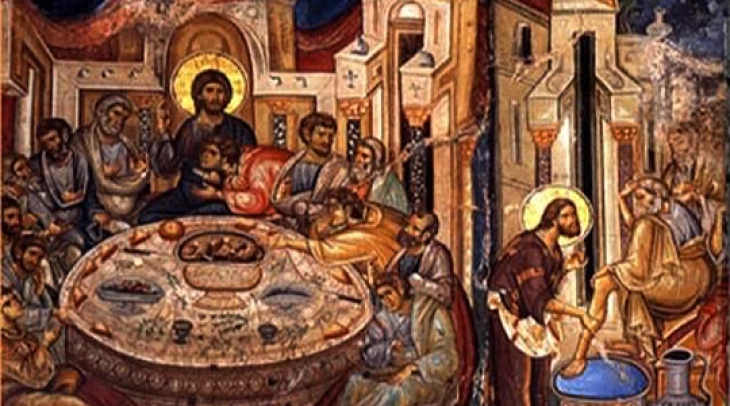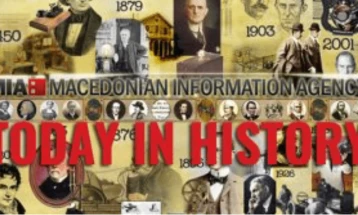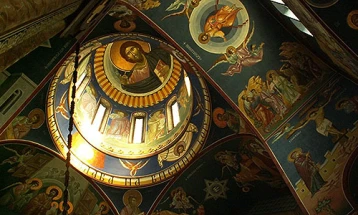
5 July 2024 (MIA)
Macedonian Orthodox Church Calendar
The Hieromartyr Eusebius, Bishop of Samosata
He was a major opponent of Arianism. When the patriarchal throne of Antioch became vacant, Meletius was elected Patriarch. This Meletius was a shining light in the Church, and deserved the great eulogy given by St John Chrysostom at his death. But the Arians soon drove Meletius from Antioch. When Constantius, Constantine’s evil son, died, he was followed by Julian the Apostate, a man even worse than he, as ruler of the Empire. During Julian’s persecution of Christians, St Eusebius took off his cassock, clad himself in soldier’s garb and travelled around the persecuted churches of Syria, Phoenicia and Palestine, strengthening the Orthodox faith everywhere and creating the necessary priests, deacons and other clergy and raising some to the episcopate. After the news of Julian’s death, St Eusebius advised Meletius to summon a Council of the Church in Antioch. This took place in 363, and the twenty-seven hierarchs present denounced Arianism once again and proclaimed the Orthodox faith as it was expressed at the First Ecumenical Council. Besides Meletius and Eusebius, St Pelagius of Laodicea, a man of great asceticism and chastity, made a great impact at this Council, which took place during the reign of the devout Emperor Jovian. But he died soon after, and the evil Valens took the throne, and the persecution of Orthodoxy began afresh. St Meletius was banished to Armenia, Eusebius to Thrace and Pelagius to Arabia. After Valens, the Emperor Gratian came to the throne and restored freedom to the Church, returning the exiled bishops to their rightful places: Meletius to Antioch, Eusebius to Samosata and Pelagius to Laodicea. Many dioceses were vacant at that time and Eusebius was quick to find canonical pastors for the people. But when he arrived at the city of Doliche with the newly chosen bishop, Marinus, to install him as bishop and denounce the Arian heresy (which was strong in that city), a certain fanatical heretic threw a tile from the roof and gave him a mortal wound. This great zealot for Orthodoxy, this saint and martyr died and entered into eternal life in the blessedness of Paradise in the year 379.
Catholic Calendar
Sts. Cyril and Methodius
These brothers, the Apostles of the Slavs, were born in Thessalonica, in 827 and 826 respectively. Though belonging to a senatorial family they renounced secular honours and became priests. They were living in a monastery on the Bosphorous, when the Khazars sent to Constantinople for a Christian teacher. Cyril was selected and was accompanied by his brother. They learned the Khazar language and converted many of the people. Soon after the Khazar mission there was a request from the Moravians for a preacher of the Gospel. German missionaries had already laboured among them, but without success. The Moravians wished a teacher who could instruct them and conduct Divine service in the Slavonic tongue. On account of their acquaintance with the language, Cyril and Methodius were chosen for their work. In preparation for it Cyril invented an alphabet and, with the help of Methodius, translated the Gospels and the necessary liturgical books into Slavonic. They went to Moravia in 863, and laboured for four and a half years. Despite their success, the Germans with distrust regarded them, first because they had come from Constantinople where schism was rife, and again because they held the Church services in the Slavonic language. On this account Nicholas I, who died, however, before their arrival, summoned the brothers to Rome. His successor, Adrian II, received them kindly. Convinced of their orthodoxy, he commended their missionary activity, sanctioned the Slavonic Liturgy, and ordained Cyril and Methodius bishops. Cyril, however, was not to return to Moravia. He died in Rome, 4 Feb., 869. But John VIII, after an inquiry, sanctioned the Slavonic Liturgy, decreeing, however, that in the Mass the Gospel should be read first in Latin and then in Slavonic. Witching, in the meantime, had been nominated one of the suffragan bishops of Methodius. He continued to oppose his metropolitan, going so far as to produce spurious papal letters. The pope, however, assured Methodius that they were false. Methodius went to Constantinople about this time, and with the assistance of several priests, he completed the translation of the Holy Scriptures, with the exception of the Books of Machabees. He translated also the “Nomocanon”, i.e. the Greek ecclesiastico-civil law. The enemies of Methodius did not cease to antagonise him. His health was worn out from the long struggle, and he died 6 April, 885, recommending as his successor Gorazd, a Moravian Slav who had been his disciple.







